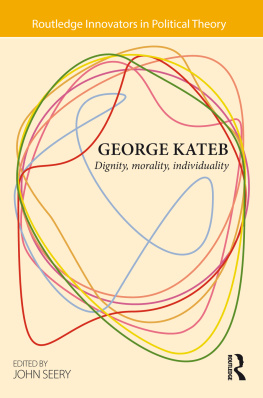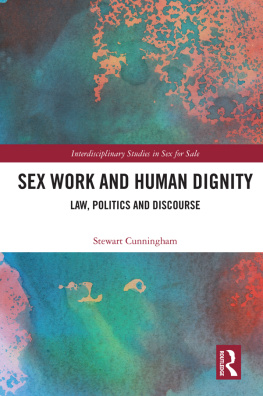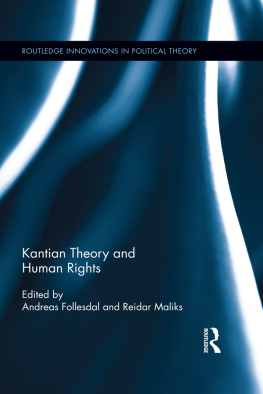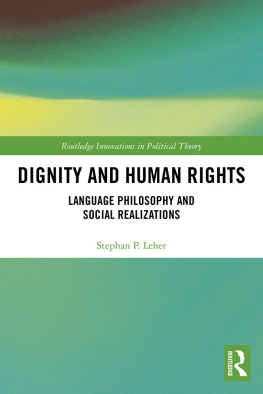
George Kateb
George Katebs writings have been innovatory in exploring the fundamental quandary of how modern democracy sovereignty vested in the many might nevertheless protect, respect, promote, even celebrate the singular, albeit ordinary individual. His essays, often leading to unexpected results, have focused on many interrelated topics: rights, representation, constitutionalism, war, evil, human extinction, punishment, privacy, patriotism, and more. This book focuses in particular on Katebs thought in three key areas:
1 Dignity. These essays exhibit the breadth and complexity of Katebs notion of dignity and outline some implications for political theory. Rather than a solely moral approach to the theory of human rights, he elaborates a human-dignity rationale for the very worth of individuals and the human species.
2 Morality. Here Kateb challenges the position that moral considerations are often too demanding to have a place in the rough-and-tumble of modern politics and political analysis. Rejecting common justifications for the propriety of punishment, for example, he insists that state-based punishment is a perplexing moral problem that cannot be allayed by repairing to theories of state legitimacy.
3 Individuality. These essays gather some of Katebs rejoinders and correctives to common conceptions and customary critiques of the theory of democratic individuality. He also explains that Lockes hesitations and religious backtracking are instructive, perhaps as precursors for the ways in which vestigial beliefs can still cloud moral reasoning.
John Seery is George Irving Thompson Memorial Professor of Government and Professor of Politics at Pomona College, Claremont CA, USA. He has written books on themes such as irony, death, liberal arts education, and constitutional age requirements, and his articles have covered a range of subjects, from Platos Republic to Grant Woods American Gothic.
George Kateb
Dignity, morality, individuality
Edited by
John Seery

First published 2015
by Routledge
2 Park Square, Milton Park, Abingdon, Oxon OX14 4RN
and by Routledge
711 Third Avenue, New York, NY 10017
Routledge is an imprint of the Taylor & Francis Group, an informa business
2015 John Seery and George Kateb
The right of John Seery to be identified as the editor of this work has been asserted by him in accordance with the Copyright, Designs and Patents Act 1988.
All rights reserved. No part of this book may be reprinted or reproduced or utilised in any form or by any electronic, mechanical, or other means, now known or hereafter invented, including photocopying and recording, or in any information storage or retrieval system, without permission in writing from the publishers.
Trademark notice: Product or corporate names may be trademarks or registered trademarks, and are used only for identification and explanation without intent to infringe.
British Library Cataloguing in Publication Data
A catalogue record for this book is available from the British Library
Library of Congress Cataloging in Publication Data
Kateb, George.
[Works. Selections. 2014]
George Kateb : dignity, morality, individuality / edited by John Seery.
pages cm. -- (Routledge innovators in political theory ; 6)
Includes bibliographical references and index.
1. Democracy--Philosophy. 2. Dignity. 3. Political ethics. 4. Individu- alism--Political aspects. I. Seery, John Evan, editor of compilation. II. Title.
JC423.K335 2014
320.01--dc23
2014017193
ISBN: 978-1-138-01749-8 (hbk)
ISBN: 978-1-315-74709-5 (ebk)
Typeset in Times New Roman
by Taylor & Francis Books
Contents
PART I
Dignity
PART II
Morality
PART III
Individuality
We are grateful to the following publishers and journals for permission to reprint the chapters in this collection: Taylor & Francis for Chapter 2 Is John Gray a nihilist? Critical Review of International Social and Political Philosophy, vol. 9, no. 2, June 2006, pp. 30522. Johns Hopkins Press for On being watched and known Social Research, vol. 68, no. 1, Spring 2001, pp. 26995, Chapter 4 Punishment and the spirit of democracy Social Research, vol. 74, no. 2, Summer 2007, pp. 269306, Chapter 5, Morality and self-sacrifice, martyrdom and self-denial Social Research, vol. 75, no. 2, Summer 2008, pp. 35394, Chapter 8, Locke and the political origins of secularism Social Research, vol. 76, no. 4, Winter 2009, pp. 100134 and Chapter 9, Arendt and individualism Social Research, vol. 61, no. 4, Winter 1994, 76594. Rutgers University Press for Chapter 6, Democracy and untruth Raritan, vol. 31, no 3, Winter 2012. University of Minnesota Press for Chapter 10, Individuality and egotism in Bonnie Honig and David R. Mapel, eds, Skepticism, Individuality, and Freedom, 2002.
Every effort has been made to contact copyright holders for their permission to reprint material in this book. The publishers would be grateful to hear from any copyright holder who is not here acknowledged and will undertake to rectify any errors or omissions in future editions of this book.
George Kateb is our foremost theorist of democratic individuality. Quickly that dangled claim requires explanation and qualification. For 50 years, building on the writings and extending the main legacies of Emerson, Thoreau, and Whitman, Kateb has explored the fundamental quandary of how modern democracy sovereignty vested in the many might nevertheless protect, respect, promote, even celebrate the singular, albeit ordinary individual. The barebones answer to the question of how to cultivate such individuality, that is to say, an individuality true to democratic rather than aristocratic aspirations, would be found, Kateb has proposed, in the protections afforded and the virtues indirectly fostered by a rights-based constitutional democratically representative republic.
That formal answer was only the beginning of Katebs extended inquiries. There would be much more to examine, to propose, and to ponder. His essayist investigations, often leading to unexpected results, have focused on many interrelated topics: rights, representation, constitutionalism, war, political evil, human extinction, punishment, privacy, patriotism, pluralism, and more. He has written expositions probing and poking the ideas of many seminal figures, most notably Socrates, Hobbes, Locke, Rousseau, Mill, the American transcendentalists, Nietzsche, Heidegger, and Arendt. Looking for leads and inklings, the principles and precursors to modern democratic individuality, he has turned the Western canon inside out, squeezing and scrutinizing those classic texts yet again, acting on the assumption that their words repay renewed attention.
In all of this writing, voluminous all told, Katebs approach to political theorizing hasnt conformed to the methods of the conventional camps and prevailing scholarly schools in the field. His writing is sometimes normative and idealizing, sometimes critical and caustically so; sometimes exegetical, or contextual; part literary, part analytic; now brooding, now conclusive. But theres a unique voice, a clear voice, running throughout, which seems to hold these many studies together, as opposed to scattering them. It is a patient yet insistent voice, one that seems to summon ones readers, tacitly positioned as equals, to be serious and attentive and thoughtful. It is a cant-free voice that exemplifies, and thus encourages, the very importance of self-reliant thinking. In writing, Kateb practices the democratic individuality that he preaches. By definition, however, converts to his way of thinking cannot be described as a flock. If his essays prove compelling, they do so reader by reader, one at a time and over time, individual by individual, if only because Kateb openly eschews like-mindedness and easy assent.
Next page











